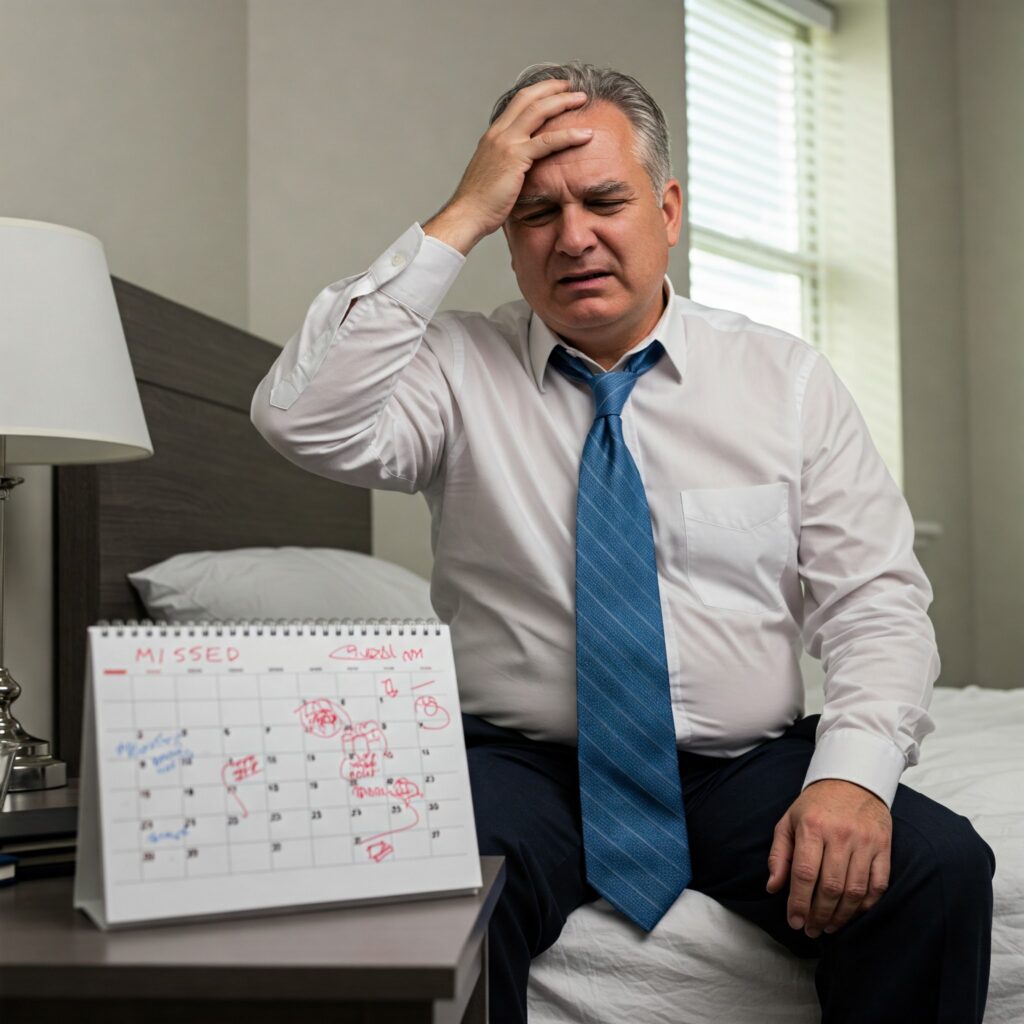Is It Just Burnout or Something Deeper? Recognizing Depression in High-Performing Professionals in Florida & Illinois
Imagine a top executive in Miami powering through 12-hour workdays, or a Chicago attorney who’s always on call. From the outside, they seem to have it all together. But behind the scenes, they collapse on the couch each night feeling utterly drained. They tell themselves it’s just burnout from the job’s demands. Yet a nagging question lingers: what if it’s something deeper? Burnout and depression can look alike, but they aren’t the same. Burnout often improves with a weekend off or a vacation, whereas depression persists and affects every part of life. In this article, we’ll explore how to tell the difference – and what to do if you recognize the signs in yourself. Is it just burnout, or the early signs of depression? Let’s find out.
What Makes Professional Depression Unique?
High-performing professionals are no strangers to stress. But when that stress masks an undercurrent of depression, it often goes unnoticed. Professional depression – sometimes called high-functioning depression – doesn’t fit the stereotypical image of someone who “can’t get out of bed.” Instead, you might still excel at work, meet deadlines, and outwardly appear fine. Internally, though, you may feel as if you’re “hanging on by a thread.” In clinical terms, you have many of the same symptoms as major depression (low mood, hopelessness, fatigue, etc.), but you continue to function in your demanding role. This functioning comes at a steep cost: tasks that used to take minimal effort now drain you exponentially more.
What makes depression in professionals unique is how well it can hide in plain sight. Colleagues see you as successful and put-together, so they might not realize you’re suffering. You might not realize it yourself, attributing your irritability or exhaustion to “just the job.” High achievers often pressure themselves to push through and may feel guilt or shame for struggling, which further camouflages the depression. Think of it like a duck gliding on a pond – above water all seems calm, while below the surface the duck’s legs are paddling furiously to stay afloat. Similarly, a professional with hidden depression expends tremendous effort to get through the day, all while quietly suffering. Recognizing this hidden struggle is the first step to getting the right help.
5 Hidden Warning Signs of Depression in Professionals
Even if you’re functioning at work, certain subtle signs can reveal that what you’re dealing with is more than burnout. Below are five hidden warning signs of depression commonly seen in busy professionals. As you read, ask yourself if any of these hit close to home. If they do, it may be time to consider speaking with a therapist – perhaps a local depression therapist in Florida or a concierge therapy service in Illinois – who understands mental health for professionals.
- Constant Exhaustion Despite Rest – You’re not just tired from a long week; you’re bone-deep exhausted all the time. Even after a full night’s sleep or a weekend off, your energy doesn’t rebound. This isn’t normal “busy-professional fatigue.” Depression-related fatigue is pervasive and unrelenting – it can take ten times more effort to do the same tasks. In fact, fatigue is one of the most common depression symptoms, occurring in over 90% of people with major depression. You might find yourself needing multiple coffees to get through the day, struggling to focus in morning meetings, or feeling like you’re in a fog by mid-afternoon.

- No Joy or Passion (Blunted Motivation) – High achievers are usually driven by goals and passion. Another warning sign is when that inner spark is gone. Projects that used to excite you now feel like a chore. Hobbies or exercise you once loved have fallen by the wayside – not just because you’re busy, but because you can’t find the joy. This loss of interest in activities, known clinically as anhedonia, is a hallmark of depression. Up to 70% of people with depression experience a marked loss of pleasure in things they used to enjoy. In a professional context, you might achieve a big win – a closed deal, a successful event, a promotion – yet feel empty or unenthused about it. When work achievements no longer bring satisfaction, and you’re just going through the motions, it’s a red flag that it might not be mere burnout.

- Irritability, Cynicism or “Short Fuse” – Stress can make anyone irritable, but depression can quietly heighten anger and cynicism beyond what’s typical for you. Maybe you notice you’re snapping at colleagues or family over minor things. Small work frustrations – an email typo, a postponed meeting – ignite disproportionate anger or sarcastic cynicism. Co-workers might joke that you’ve become “grumpier,” or you find yourself seething inside while maintaining a polite front. This isn’t just normal stress; research shows irritability is a common facet of depression (often overlooked in adults). In fact, about two-thirds of people with depression report significant irritability and anger symptoms. If you’re usually composed but lately your temper is paper-thin, depression could be the hidden culprit.

- Withdrawing from Colleagues and Loved Ones – High-performing professionals often have packed schedules, but depression can make you pull away even when you do have time. Pay attention if you’ve been avoiding social interactions that you used to engage in. For example, skipping networking events you once found valuable, canceling dinner with friends because you “just don’t feel like it,” or holing up in your office with the door closed more often. Loved ones might comment that you’re hard to reach lately. Depression frequently brings feelings of isolation, and many professionals retreat under the guise of being “too busy.” In reality, you might be losing interest in socializing or lacking the energy to engage – a subtle sign of a deeper issue. This kind of withdrawal can reinforce feelings of loneliness and make the depression worse. If you catch yourself constantly saying “I just need some alone time” but never actually recharging, consider that something more might be going on.

- Physical Signs and Health Changes – Depression doesn’t just affect your mind; it often shows up in the body. Busy professionals might write off these changes as stress or aging, but they can be key clues. Perhaps you have frequent headaches, neck or back pain flare-ups, or digestive issues (like nausea or stomach aches) that weren’t there before. Maybe your appetite has changed – you’re skipping meals without noticing, or conversely stress-eating and gaining weight. These physical symptoms are common in depression. Nearly 50% of people with major depression experience a decrease in appetite, and about one-third have significant weight loss. On the flip side, some experience increased appetite or cravings. And about 65% of those with depression report unexplained aches and pains, such as headaches or back pain. If your doctor can’t find a medical cause for your chronic pain or sudden weight change, it could be depression manifesting in a sneaky way.

After reading these signs, do they resonate with you? It’s easy for a driven professional to ignore these red flags, attributing them to “just how life is right now.” But if you see yourself in several of these descriptions, consider it a gentle alarm. High performers in cities like Tampa or Chicago often convince themselves to just power through, but untreated depression can worsen over time. The good news is you don’t have to hit “rock bottom” to seek help. Speaking with a professional can provide clarity. You might start by reaching out to a depression therapist in Florida or exploring virtual depression therapy options that fit your packed schedule. Therapists who specialize in mental health for professionals understand the unique pressures you face. Even a consultation can help determine whether it’s truly burnout or early signs of depression – and what to do about it.
How Concierge Therapy in Florida and Illinois Can Help
When you’re a busy, self-paying professional, getting help for depression shouldn’t add more stress to your plate. This is where concierge therapy comes in. Concierge therapy is a premium, personalized approach to mental health care – and it’s exactly the kind of support high-achievers often need. At LAMCO Wellness (serving Florida and Illinois), the concierge model is designed for privacy, convenience, and tailored care.
- Privacy: Concerned about your reputation or confidentiality? Concierge therapy offers the utmost discretion. Because it’s typically a self-pay service (not involving insurance), your therapy remains private and off the official medical records. Sessions are one-on-one and conducted with strict confidentiality. In a close-knit professional community – whether in a Florida coastal city or an Illinois suburb – this level of privacy can be a huge relief. You can seek help without worrying that colleagues or insurers will know.
- Convenience: Busy professionals often struggle to find time for therapy. That’s why LAMCO’s concierge therapy prioritizes convenience. Need evening or weekend appointments because your weekdays are jam-packed? Prefer texting or calling your therapist between sessions for quick check-ins? Concierge therapists accommodate your schedule in a way traditional clinics often can’t. Many services offer virtual depression therapy, allowing you to have sessions from your home or office via secure video. Whether you’re in downtown Orlando or rural Illinois, as long as you have a phone or laptop, help is accessible on your terms. This flexibility means your mental health can fit seamlessly into your life – no commutes, no waiting rooms, no rigid 9-5 appointment slots.
- Tailored, High-Quality Care: Perhaps the most significant benefit is the personalized care you receive. Concierge therapy through LAMCO is not a one-size-fits-all approach. Therapists take the time to get to know you and the nuances of your situation. Are you a surgeon with high stakes and high stress? A lawyer balancing massive caseloads? A tech entrepreneur managing a remote team across time zones? Your therapist will tailor evidence-based treatments to your lifestyle and challenges. This might include custom therapy homework that fits into a business trip, strategies to manage depressive symptoms during high-pressure meetings, or blending modalities (like cognitive-behavioral techniques with mindfulness) that align with your personality. The concierge model often involves a smaller caseload for the therapist, which means you get more attention and quicker responses when things come up. It’s like having a dedicated mental health partner in your corner.
In Florida and Illinois, LAMCO Wellness embraces this concierge ethos to serve professionals who demand the best – in work and in health. By choosing a concierge therapy in Florida or Illinois, you’re investing in a premium service where your well-being is the priority. This kind of therapy recognizes that high-performing individuals have unique needs: you may require sessions outside typical hours, an ability to reach your therapist in between appointments, or a deeper understanding of how your career ties into your mental health. Concierge therapy provides that level of care. It’s therapy on your terms, without the hassles, so you can focus on getting better.
There’s Light at the End of the Tunnel
Feeling burned out and wondering if it’s more than burnout can be frightening, especially for those who are used to having everything under control. But here’s the reassuring truth: you are not alone, and help is available. Depression in high-performing professionals is more common than you might think, and it is treatable. In fact, between 70% and 90% of people with depression eventually respond well to treatment and experience significant relief. The key is recognizing the signs and taking action. Ignoring persistent exhaustion, joylessness, or other red flags in hopes that you can “tough it out” might only prolong your pain.
Consider this your encouragement to prioritize you. You’ve invested countless hours in your career; it’s okay – even necessary – to invest time in your mental well-being. Whether that means contacting LAMCO Wellness for a consultation, finding a trusted depression therapist in Florida, or scheduling a low-key virtual session during your lunch break, taking that step is an act of strength. There is no shame in seeking help; in fact, it’s a savvy strategy to protect the asset that is yourself. So, ask yourself one more time: Is it just burnout, or is it something deeper? If your gut tells you it could be more, listen. By reaching out for support through options like concierge therapy in Illinois or Florida, you’re not just treating potential depression – you’re also learning tools to prevent burnout and thrive in a sustainable way. The path to feeling like yourself again – passionate, productive, and genuinely well – is absolutely within reach. Take the first step, and know that a happier, healthier you on the other side of burnout is possible.

